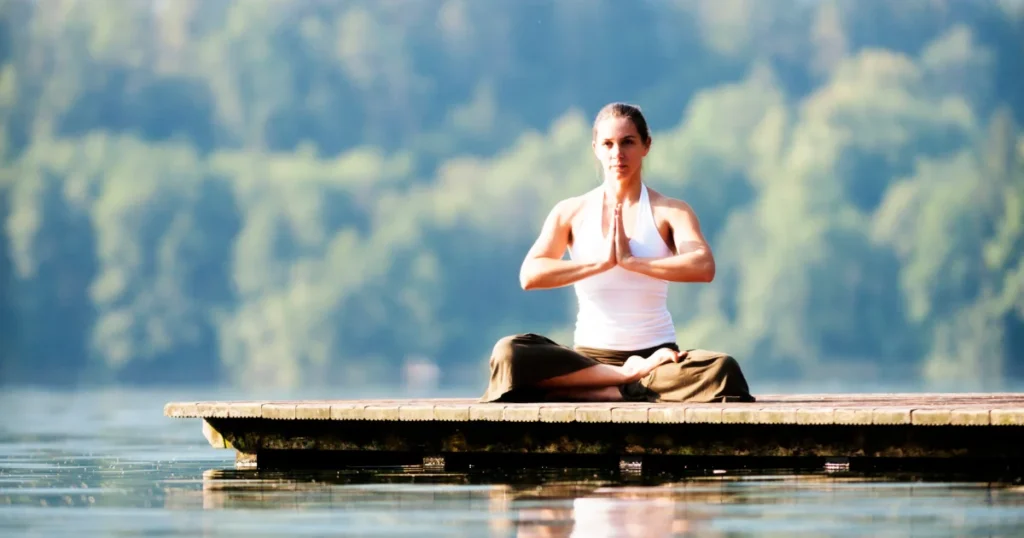Cultivating Inner Peace: The Power of Mindfulness and Meditation

Introduction
We are continually overwhelmed with distractions, worry, and anxiety in today’s fast-paced society. We often find ourselves feeling overwhelmed, exhausted, and disconnected from our inner selves. But what if we go ahead in cultivating inner peace and presence amidst all the chaos and noise? What if we could learn to quiet our minds and connect with our true selves? Mindfulness and meditation can be used to address this.
We’ll address the positive aspects of mindfulness and meditation in this blog article. And further, check how they can help us cultivate inner peace and presence in our lives.
What is mindfulness? How can it yield cultivating inner peace?
The practice of mindfulness entails living in the present while having an open mind. It implies mindfully and peacefully monitoring our thoughts, feelings, and experiences.
Mindfulness is a way of being fully present at the moment and accepting things as they are. It can be practised in many ways, such as through meditation, yoga, or simply taking a mindful walk in nature.
What is meditation?

Meditation is a practice of training the mind to focus and be still. It involves sitting in silence, observing the breath, and letting go of distractions and thoughts. Meditation can help us in cultivating inner peace and calmness and improve our concentration, focus, and emotional regulation. There are many different types of meditation, such as;
mindfulness meditation, loving-kindness meditation, transcendental meditation, and pranic meditation.
Adopting meditation as a way of cultivating inner peace is quite effective. It can aid in mental calmness and awareness. There are many types of meditation. So, selecting a form of meditation that is effective for you is crucial!
Some people prefer guided meditations for peace. Here a teacher leads them through a series of visualizations or breathwork exercises. Few prefer silent meditation. Here they simply sit in stillness and observe their thoughts.
One popular form of meditation is mindfulness meditation. This means giving undivided attention to the present moment. It can be done anywhere, at any time, and is especially useful for those who struggle with anxiety or stress.
By focusing on our breath or the sensations in our body, we can quiet our minds and bring ourselves back to the present moment.
Benefits of Mindfulness and Meditation
There are numerous benefits to practising mindfulness and meditation, including:
1. Reduced stress and anxiety
Mindfulness and meditation can help us manage stress and anxiety. It promotes relaxation and reduces the fight-or-flight response.
2. Improved mental health
Studies have shown that mindfulness and meditation can help reduce symptoms of depression and anxiety. It improves overall well-being and assists in cultivating inner peace. There are many ways to overcome depression without meditation.
3. Better focus and concentration
Mindfulness and meditation can help us improve our ability to concentrate, focus, and stay present in the moment.
4. Increased self-awareness
By objectively monitoring our thoughts, feelings, and behaviours, mindfulness and meditation can assist us to grow more self-aware.
5. Enhanced emotional regulation
Mindfulness and meditation can help us regulate our emotions by teaching us to respond to situations in a more calm and rational way.
Tips on cultivating inner peace through Mindfulness and Meditation
1. Start small
Just a few minutes a day of meditation is a good place to start. As you feel more at ease, you can extend the duration.
2. Find a quiet space
Choose a soft and comfortable space where you won’t be interrupted or distracted.
3. Focus on the breath
During meditation, focus on your breath and let go of any distractions or thoughts.
4. Practice self-compassion
Be kind and compassionate to yourself as you practice mindfulness and meditation. Do not criticise yourself for any diversion or distracting ideas.
5. Be consistent
Consistency is the key when it comes to cultivating inner peace through mindfulness and meditation. Stay persistent and you will endure good results.
Mindfulness and meditation can help us in cultivating inner peace and a sense of presence in our lives. By practising these techniques, we can reduce stress and anxiety. Further, improving our mental health, and enhancing our emotional regulation.
The key is to start small, be consistent, and practice self-compassion. Take a few minutes each day to practice mindfulness and meditation and see how it can transform your life for the better.
Various Ways of Cultivating Inner Peace

Another way for cultivating inner peace is to practice gratitude. It’s easy to be preoccupied with what we lack or what we wish we did. But taking a moment each day to reflect on what we’re grateful for can shift our mindset and bring us more inner peace.
Some people like to keep a gratitude journal and write down a few things they’re grateful for each day. Others like to express gratitude through meditation or prayer.
Another way of cultivating inner peace is to practise self-care. Our physical, emotional, and mental wellness are all important to consider.
It’s important to prioritize activities that nourish our bodies and minds. Such as eating well, getting enough sleep, and engaging in activities that bring us joy. It’s also important to set boundaries and say no to activities or relationships that drain our energy and cause stress.
In addition to these practices, connecting with nature can also help us in cultivating inner peace. Being outside in nature has been shown to reduce stress and improve mood.
Spending time in nature can help us feel more connected to ourselves and the world around us. Whether it’s taking a walk in the park, going for a hike, or simply sitting outside and observing the natural world, connect with nature.
Conclusion
Cultivating inner peace is not a one-time event but rather an ongoing practice. It requires us to be patient with ourselves and to make a commitment to prioritize our well-being. By incorporating these practices into our daily lives, we can begin to cultivate more peace, presence, and joy in our lives.
Cultivating inner peace is a lifelong journey. And it requires intention, commitment, and patience. By incorporating the above-mentioned practices into our daily lives, we can cultivate more peace, presence, and joy.
Whether we’re new to these practices or have been practising for years, there is always room to deepen our connection to ourselves and the world around us.




Comment